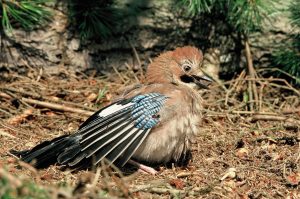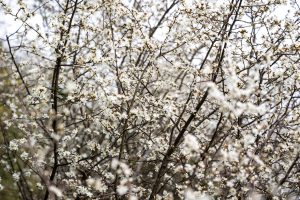Tips for feeding birds in winter
Compared to previous years, last summer’s poor weather resulted in depleted fruit harvests throughout the country – and that means birds’ natural food sources suffer.
Consequently, many birds are making their way in to gardens earlier than normal in the search for food, with the number of birds appearing in gardens typically doubling once the colder weather hits.
Unfortunately, many small ground feeding birds such as Blackbirds, Robins and Thrushes that are unable to get on to feeders may perish once the cold weather sets in and the ground is draped with snow.
And, although there have been some fears about feeding garden birds (critics argue it maintains the population artificially), the RSPB and the British Trust for Ornithology advocate keeping out bird food all year round.
With this in mind, read on for Vine House Farm’s top tips for feeding birds this winter:
Although it is always tempting to put out a lot of food for the birds, too much food leads to the risk of it going mouldy or being contaminated. Your best bet is to provide small amounts and change it regularly. Additionally, with live food such as insects, , worms and larvae decreasing in numbers over the last 30 years, a supply of live mealworms in your garden will be of huge benefit to wild birds, regardless of the season, but especially during the breeding season.
When the ground is covered with snow, Blackbirds, Robins and Song Thrushes will adore the VHF Ground Mix. It is packed with sultanas, rolled oats and sunflower heart chips - ideal for ground feeding birds. Also, with bird baths likely to freeze over as temperatures plummet, many birds can perish due to dehydration. Therefore, putting out fresh water every day can be a real lifesaver.
A high protein diet containing plenty of calories can be vital for some birds to make it through the colder months. Foods high in fat or oil content provide enough fuel to see them through the winter. Nutritious winter foods such as sunflower seeds and super suet balls are ideal – and they may help you attract species such as woodpeckers, tits and Starlings.
Food can be scarce for many animals over the winter, so it is a good idea to safeguard the food you are providing for the birds. Specialised feeders will protect against large birds or squirrels stealing the food. Also, garden birds are likely to fear attacks from predators so it is advisable to place feeders close to trees and thick shrubs, allowing the birds to escape quickly if threatened. This approach gives smaller birds the security they need to return to your garden.
Your bird feeders require cleaning and sterilising on a regular basis. Keeping mould and mildew to a minimum means diseases are less likely to thrive – and this means a reduced risk to the health of the birds. Remove old seeds from your feeder and, if possible, provide more than one feeder to give the birds a bit of variety and plenty of space. Additionally, if you have a birdbath, it is advisable to empty it every day, wipe it clean and refill with fresh water.
Consequently, many birds are making their way in to gardens earlier than normal in the search for food, with the number of birds appearing in gardens typically doubling once the colder weather hits.
Unfortunately, many small ground feeding birds such as Blackbirds, Robins and Thrushes that are unable to get on to feeders may perish once the cold weather sets in and the ground is draped with snow.
And, although there have been some fears about feeding garden birds (critics argue it maintains the population artificially), the RSPB and the British Trust for Ornithology advocate keeping out bird food all year round.
With this in mind, read on for Vine House Farm’s top tips for feeding birds this winter:
1. A little goes a long way
Although it is always tempting to put out a lot of food for the birds, too much food leads to the risk of it going mouldy or being contaminated. Your best bet is to provide small amounts and change it regularly. Additionally, with live food such as insects, , worms and larvae decreasing in numbers over the last 30 years, a supply of live mealworms in your garden will be of huge benefit to wild birds, regardless of the season, but especially during the breeding season.
2. Beware of the big freeze
When the ground is covered with snow, Blackbirds, Robins and Song Thrushes will adore the VHF Ground Mix. It is packed with sultanas, rolled oats and sunflower heart chips - ideal for ground feeding birds. Also, with bird baths likely to freeze over as temperatures plummet, many birds can perish due to dehydration. Therefore, putting out fresh water every day can be a real lifesaver.
3. Use foods high in fat
A high protein diet containing plenty of calories can be vital for some birds to make it through the colder months. Foods high in fat or oil content provide enough fuel to see them through the winter. Nutritious winter foods such as sunflower seeds and super suet balls are ideal – and they may help you attract species such as woodpeckers, tits and Starlings.
4. Safeguard the bird food
Food can be scarce for many animals over the winter, so it is a good idea to safeguard the food you are providing for the birds. Specialised feeders will protect against large birds or squirrels stealing the food. Also, garden birds are likely to fear attacks from predators so it is advisable to place feeders close to trees and thick shrubs, allowing the birds to escape quickly if threatened. This approach gives smaller birds the security they need to return to your garden.
5. Keep it clean
Your bird feeders require cleaning and sterilising on a regular basis. Keeping mould and mildew to a minimum means diseases are less likely to thrive – and this means a reduced risk to the health of the birds. Remove old seeds from your feeder and, if possible, provide more than one feeder to give the birds a bit of variety and plenty of space. Additionally, if you have a birdbath, it is advisable to empty it every day, wipe it clean and refill with fresh water.


